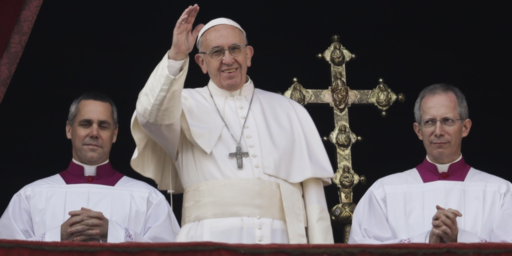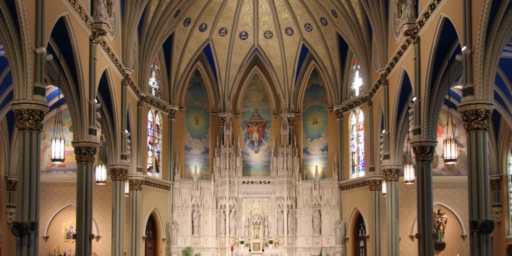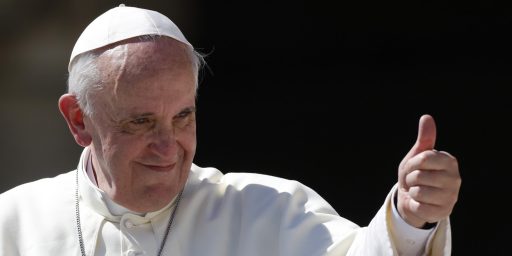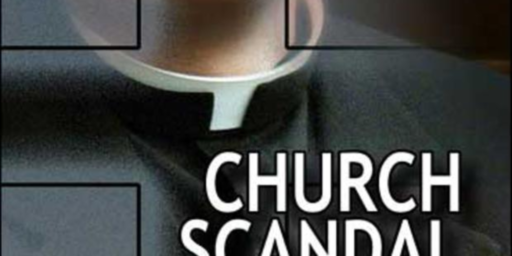Cardinal Joseph Ratzinger Becomes Pope Benedict XVI
“God’s Rottweiler” arises from the white smoke:
Thousands Cheer in St. Peter’s Square as New Leader Emerges (NYT | RSS)
Cardinal Joseph Ratzinger was elected pope today, taking the name Benedict XVI, then telling a wildly cheering crowd from a balcony on St. Peter’s Basilica, “I entrust myself to your prayers.”
The 265th leader of the Roman Catholic Church, smiling broadly, was introduced by Cardinal Medina Estevez of Chile, who emerged from behind huge velvet drapes to announce, “We have a new pope!”
His selection came in the evening of the second day of the conclave of cardinals in the Sistine Chapel. Bells rang out over St. Peter’s Square and white smoke drifted from a Sistine Chapel chimney signaling that the ballot had been decided.
The new pope, who was born in Marktl am Inn, Germany, and turned 78 on Saturday, was one of the closest collaborators of John Paul II. As the head of the Congregation for the Doctrine of the Faith he has been the Church’s doctrinal watchdog since 1981.
He has been described as a conservative, intellectual clone of the late pontiff, and, as the Dean of the College of Cardinals, he was widely respected for his uncompromising – if ultraconservative – principles and his ability to be critical.
As cardinal, he had shut the door on any discussion on several issues, including the ordination of women, celibacy of priests and homosexuality, defending his positions by invoking theological truth. In the name of orthodoxy, he is in favor of a smaller Church, but one that is more ideologically pure.
That last paragraph, which suggests that Ratzinger is authoritarian, requires context. Though he is indeed doctrinally conservative, he doesn’t necessarily have a predisposition to stamping out dissenting voices. Thomas Williams explains:
Particularly striking is Ratzinger’s description of his youth, especially during the years of National Socialism. Having grown up in a Germany dominated by Nazi propaganda and the suppression of heterodox opinions, he grew notably inimical to authoritarianism and ideologies that attempt to stamp out uncomfortable truths, especially the truth about God and the human person. Once we have suppressed the truth, Ratzinger says, we are left only with our personal choice, which is necessarily arbitrary. “When decisions are left solely to the domain of the will, whether particular or collective, man is debased.” Like Pope John Paul, Ratzinger believes that the proclamation of the truth is the greatest guarantee of human freedom. This conviction is enshrined in his episcopal motto, Cooperatores Veritatis, which he adopted when ordained archbishop of Munich-Freising in 1977.
In addition, Ratzinger’s preference for “a smaller Church” isn’t simply “[i]n the name of orthodoxy.” He believes that large bureaucracies can lose track of their central missions and end up doing a disservice to people. Reports John Allen:
Because Ratzinger is the prime theoretician of papal authority, it is often assumed that under him the Vatican would take on even more massive proportions. In fact, like most conservatives, Ratzinger feels an instinctive aversion to big government. He believes that bureaucracies become self-perpetuating and take on their own agendas, rarely reflecting the best interests of the people they are intended to serve.
“The power typical of political rule or technical management cannot be and must not be the style of the church’s power,” Ratzinger wrote in 1988’s A New Song for the Lord. “In the past two decades an excessive amount of institutionalization has come about in the church, which is alarming. … Future reforms should therefore aim not at the creation of yet more institutions, but at their reduction.â€
While Ratzinger would not hesitate to make decisions in Rome that others believe should be the province of the local church — revoking imprimaturs, replacing translations, dismissing theologians — he would not erect a large new Vatican apparatus for this purpose. Ratzinger would encourage bishops’ conferences and dioceses to shed layers of bureaucracy where possible. The overall thrust would be for smaller size, less paperwork, and more focus on core concerns.
Update: Since the press is characterizing Ratzinger’s selection as a vote of continuity, I think it’s important to highlight some significant differences between Benedict XVI and John Paul II. Note:
Borrowing John Courtney Murray’s useful distinction between two valid Christian orientations, an incarnational humanism (which emphasizes Christianity’s immanence and the close link between grace and the nature it perfects), and an eschatological humanism (which focuses on Christianity’s otherworldliness and man’s pilgrim condition), Ratzinger clearly leans toward the latter–whereas John Paul II tends toward the former.
Concerning prospects for ecumenism, for example, Ratzinger is typically guarded: “I don’t dare to hope for a full communion of Christians within history.” This reserve hardly seems to square with John Paul’s vision of the third millennium as the millennium of Christian unity, as expressed in the encyclical Ut Unum Sint or in the Pope’s reference to Christians’ “confident quest for full communion.” Citing examples of ongoing fragmentation of the Christian communions and the formation of new splinter groups–including syncretistic sects with a mix of Christian and pagan elements–Ratzinger points to other objectives. “Much more important is that we accept each other with profound respect and love, that we recognize one another as Christians, and that we endeavor to offer the world a common witness in the essential things, both in favor of a just world order and in giving a response to the great questions about God and about man’s origin and destiny.” While this mutual acceptance and common witness are clearly of major importance, one hopes the Cardinal’s soft-pedalling of efforts toward full communion between the Christian churches won’t play at cross-purposes to John Paul’s ecumenical program.
The new evangelization receives the same reserved response. Where Pope John Paul confidently proclaims the third millennium a springtime of evangelization, Cardinal Ratzinger presents a scenario of a shrinking Church of minority status, more concerned with creating small pockets of authentic Christian living than influencing the course of society. It would seem that Ratzinger’s experience with this century’s disastrous attempts at Hegelian Utopianism–both of Marxist and Nietzschean stamp–may have left him with a permanent distaste for programs of large-scale social change.
More to follow….






My fellow political liberals already have their knives out for him (check some of the comments at Political Animal), but personally I like the choice. I want the Church to be better than me, and that means standing for something other than moral relativism.
78? “He has been described as a conservative, intellectual clone of the late pontiff,”
I’m not a papal scholar, but could this be viewed as a short term extension?
this century’s disastrous attempts at Hegelian Utopianism–both of Marxist and Nietzschean stamp
I hope whoever wrote that has read the Bible more closely than he’s read Nietzsche. “Nietzsche as Hegelian Utopian”? Dumb, dumb, dumb.
Today will mark the decline and death of the Catholic Church. The new Nazi pope does’nt have a clue how to stop the erosion of attendance in the American church. The Latin Americans will follow a more politically relevant theology. The Africans will succomb to the increasingly aggressive Anglican church.
The conclave blew it!!
It sure is fun to watch the swooning over Benedict’s accession. “It’s the end of the world!” Andrew Sullivan has never been so funny as he is today.
The world is not so fragile. Neither is the devotion of 1.3 billion Catholics to what they regard as The One True Church. “A more politically relevant theology”? Only someone completely ignorant of what theology is for could string those words together in that order, except for purposes of satire.
In his review of Ratzinger’s book, Williams wrote:
“Cardinal Ratzinger presents a scenario of a shrinking Church of minority status, more concerned with creating small pockets of authentic Christian living than influencing the course of society.”
THIS IS AS WRONG ABOUT BENEDICT AS OTHERS WERE ABOUT JPII.
When JPII was selected many thought that the RC Church was signaling detente with the USSR (because as Cardinal Wojtyla JPII had coexisted with SOviet tyranny in Poland.)
Instead, the world got a GREAT COLD WARRIOR who inspired Poles and gave them the courage to challenge Soviet tyranny.
I expect Pope Benedict to wage a SUCCESSFUL battle against relativism and THEREBY ENLARGE THE CHURCH OINCE AGAIN IN EUROPE.
Yiu never win by appeasing your enemy; relativism is the enemy; Benedict must and will defeat relativism and win back Europe.